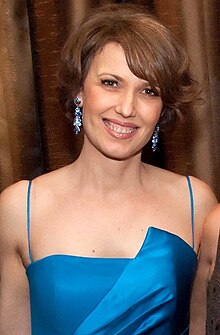Gloria Macarenko
| Gloria Macarenko | |
|---|---|

Gloria Macarenko in 2009
|
|
| Born | 1962 |
| Nationality | Canadian |
| Occupation | radio and television journalist |
| Years active | 1980s-present |
| Known for | Canada Now, The Story from Here, CBC News: Vancouver, B.C. Almanac |
Gloria Macarenko (born 1962) is a Canadian television and radio journalist. A longtime anchor or co-anchor of CBUT's local supper-hour newscast since the late 1990s; later she co-hosted CBC News: Vancouver, weekdays from 5:00-6:30 p.m. with Tony Parsons. Presently, she is the host of CBU-FM's B.C. Almanac and the national CBC Radio One documentary series The Story from Here. Macarenko has been a guest anchor on The National and CBC News Now on CBC News Network.
Macarenko was raised in Prince Rupert, British Columbia and graduated from Prince Rupert Secondary School. Her first broadcasting job was reading the news after school on weekdays and weekend mornings for CHTK Radio, Prince Rupert. She studied journalism at the British Columbia Institute of Technology (BCIT). On graduating from BCIT, Macarenko worked for two years as a beat reporter for CKWX Radio in Vancouver. In her first two years in radio she interviewed then-Prime Minister Pierre Trudeau and covered the trial of serial killer Clifford Olson. Following the Olson trial, she spent four years in Spain and France, studying languages and art history and teaching English. She returned to Canada in 1989 and was hired by CBC TV in Vancouver.
When Macarenko won the CBC TV news anchor job in 1989, her hiring was challenged by fellow journalist, Leila Paul. Paul, who had been a news anchor in New Orleans, filed a complaint with the BC Human Rights Branch alleging age-based discrimination. While Macarenko had a decade of experience in radio, she had much less experience in TV and none as a news anchor. "I hate it coming down to defending my credentials," said Macarenko. "I think it comes down to my being knowledgeable, comfortable and professional, and I think I'm all of those things." The case went to the Canadian Human Rights Commission which ruled that there was no discrimination. This was challenged in Federal Court. However, in 2002, the Commission upheld its ruling that there had been no discrimination.
...
Wikipedia
